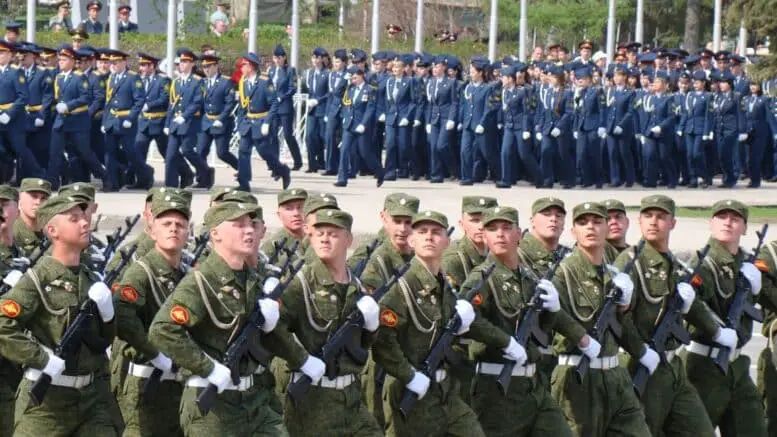Note, the following excerpt was written by Dr. Lawerence Mansour, West Point. It was originally published in The Russian Context: The Culture behind the Language, edited by Genevra Gerhart and Eloise M. Boyle. It originally appeared on SRAS.org in 2005.
The armed forces are the most important and the largest of the power agencies. In the Russian Federation they are under the direct control of the . The minister is advised by members of the , as well as his civilian assistants. The president of the Russian Federation is the .
All Russian young men must spend one to two years performing either or . Military service is notoriously dangerous and often deadly. Unfortunately, it is very difficult to get permission for alternative service so that avoiding the draft becomes a family affair: the family emigrates, or pays a large bribe; thousands of young men hide from the authorities, becoming .
At sixteen all young men in Russia have to . At seventeen, the informing them that they are subject to the draft and must show up at the local draft board office. They are then subject to a biannual which takes place from 1 April to 30 June and again from 1 October to 31 December, depending on how many are needed for full of the various branches. Starting in December 1992, young men and women have had the right to join as , but women generally serve only as , , and the like.
You can put off service only if you get a usually for Those with an advanced degree are not called up. Some major universities have an . Completing this course exempts one from the draft. Young men can also get an exemption from the draft altogether , for example, if a brother has been killed in service, or if the draftee is after the obligatory .
serve eighteen months if they are sent to the , two years if sent to the , but only one year if drafted after receiving a college degree. If they like it they may .
for recruits is led by , the and Each is generally a Training takes place at a . There new conscripts live with about 100 soldiers to a building and eat what is jokingly called – a potato or grain soup served up by the , and at night sleep on a . At around six in the morning soldiers rise to , stand for , do their , go through to get ready for , which is different from a . Breakfast and supper offer the same food, usually tea, about one pound of bread and a bowl of hot cereal with butter. Lunch is the main meal: soup, 100 grams of meat (about a quarter pound), black bread and potatoes.
Day is not done till and at around 10 pm.
The recruit learns how properly to put on a , which consists of a , a , perhaps a and, if it’s cold, a and a there’s a , and, usually, ; sometimes are worn instead of . Whatever the used, they must be . A soldier must know not only how to in a , he must also take part in . During down time he can bone up on the .
He also needs to learn marching commands:
| Attention!
At ease! Form columns! Fall in – single file! Take up arms! Sling arms Order arms! Present arms! Mark time! March! To the right! To the left! Eyes right/left! Fall out! Close on center/flanks |
Смирно!
Вольно! В колонну (по 2, по 4) становись! В колонну по одному становись! В ружьё! За спину! К ноге! На караул! На месте шагом марш! Шагом марш! Направо! Налево! Равнение направо/налево Разойдись! Сомкнись! |
He’ll want to know battle commands, too: and the ever-popular and
The first-year in the life of a is made miserable by a vicious form of where are allowed mercilessly to There is little chance of getting much . If he can’t stand it he may want to and become a for which he is likely to Young men know what is coming, as do their parents, and so many do anything they can to avoid service. As a result all branches have difficulty . Upon completion of service, a soldier goes back to being a civilian.
Given that Russia still employs universal conscription, military life (or the avoidance of it) represents a large part of the Russian collective experience. Not surprisingly, jokes and terminology from military life are common in popular culture.
Note: due to formating concerns, the above text slightly differs from that found in the original book. However, all information is still the same.




